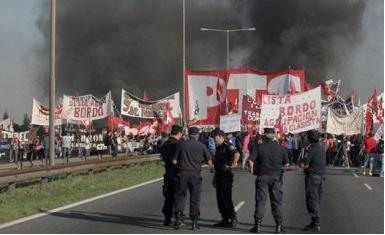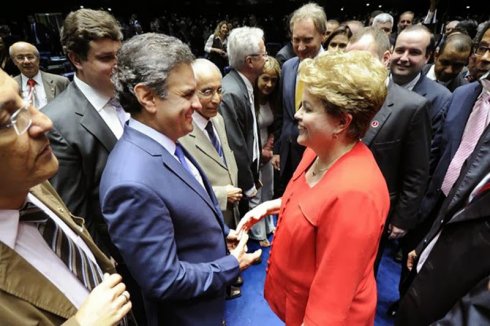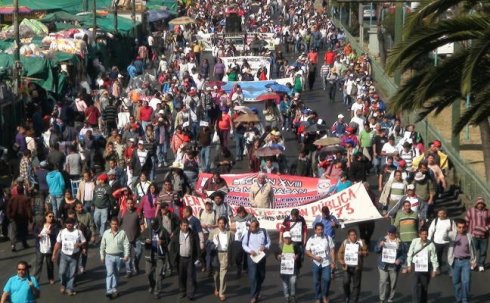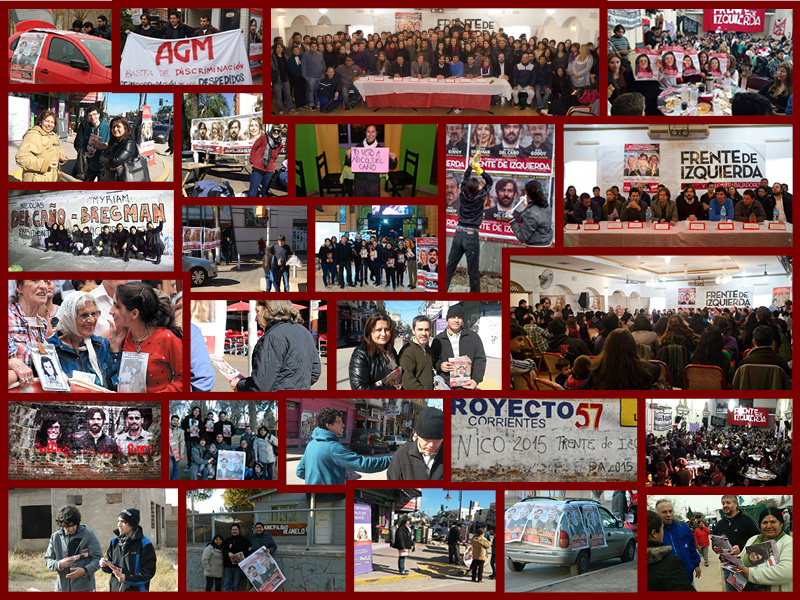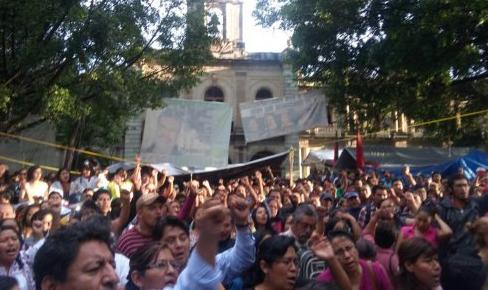United States
New attacks against the immigrants
29/09/2007 La Verdad Obrera N° 252
In a context of uneasiness maintained with the foreign policy of
George W. Bush’s government and increasing worries because of the fall
of the real estate market and the financial crisis, millions of
immigrants in the US live and work in a virtual state of siege with
the threat of arrest and deportation over their heads.
In May 2006 millions of people mobilized, most of them Latinos,
against the attempt to turn the 12 million illegal immigrants into
criminals. Big sectors came out of the shadow of oppression and
exploitation to demand basic democratic rights that the imperialist
democracy denies them, while it unscrupulously exploits the cheap
labor that Latinos represent in big sectors of the economy. This began
a debate in society, where racist prejudices persist, that allow the
bosses to sow division between whites, blacks and Latinos, among
others. In this context, attacks against the immigrants, that Latino
workers and their families are trying to resist, have become more harsh.
Profit for the bosses and modern slavery
Among those promoting the "guest worker" law, and the alleged
"comprehensive" immigration legislation, there are businessmen and the
US Chamber of Commerce itself. This is the law that was presented as
an "alternative" to the most reactionary proposals. But the
"invitation" from the US bosses has conditions: low wages, endless
workdays, the prohibition of union organizing and an expiration date,
for sure. The "guest" workers will not be able to remain, unless the
good boss wants it that way.
Many human rights organizations have called the proposed law modern
slavery, and they are not exaggerating. In addition, the law has other
jewels, like the wall with electrified barriers, and militarization
of the border with Mexico, because "national security is primary."
That is true; those who want to regularize their situation can do
it ... after 7 years of procedures, prohibitive fines for workers, and
having paid taxes punctually. This is the peculiar way the businessmen
interpret "opening a road for legalization."
There is no lesser evil, and the "alternatives" that the employers and
their parties offer do not answer the demands of the immigrants; the
only way of curbing the racist slave-labor laws, both the harsh ones,
as well as the "light" ones, is by carrying out independent mobilization.
The impasse in the debate on immigration and new attacks
The failure of a congressional agreement and the lack of determination
from the leaderships of the immigrants’ movement that chose to exert
pressure on the bosses’ parties, led to the present legal vacuum. This
vacuum is detrimental to the immigrant workers that see how their
rights are diminished daily, in the worst way. Since last year,
measures against hiring undocumented labor have become more severe,
but it is the workers who are punished, not the unscrupulous bosses.
The most widely employed means are the "no-match" letters and raids on
work places. The "no-match" letters notify employers that the
information stated by the workers does not coincide with the Social
Security data. This is one of the most common reasons that businessmen
use to fire workers demanding better working conditions or those organizing a union. Although undocumented immigrants have always experienced persecution in the US, between October 2006 and June 2007, almost 150,000 people were deported, which shows that a hostile climate, and not an impasse, prevails.
During those months, raids by the ICE (immigration, or more
accurately, anti-immigrant, police) increased. For example, the UFCW
denounced the arrests and deportations in the Swift plant, where 1,297
workers were arrested, 649 of whom were deported in March 2007.
The ICE agents burst into workplaces, arrest the workers and take them
to detention centers, with abuse, police brutality, sub-human
conditions during detention and overcrowding, according to charges [by
immigrants]. The death of the immigrant Victoria Arellano in a
detention center, after she was denied medical attention, recently
came to light.
As a result of these arrests, many families are split up, working men
and women cannot return to their homes, and their children, born in
the US, remain in the care of relatives, at best, or are completely
abandoned. The best-known case was that of Elvira Arellano, who had
spent a year sheltered with her son in a church in Chicago to avoid
being deported.
A cleaning worker, she had been arrested in an "anti-terrorist"
operation typical of the post-2001 era, and she refused to appear in
court, thus becoming the face of the immigrant movement. Arellano was
finally deported at the end of August, in front of a church where she
went for a march for immigrants’ rights. On September 9, she in
Tijuana and her eight year old son in Washington, led parallel
demonstrations against deportations.
Signs of resistance
In several cities, the raids in Latino neighborhoods have been met
with resistance, with marches, through local radio stations,
denouncing the police, warning immigrants and have even led to
confrontations with the ICE police in Los Angeles, especially in South
LA (with a Latino majority), where at the entrances of some Latino
neighborhoods there are billboards that say, "ICE, stay out."
However, the most significant and successful sign of resistance has
been the victorious strike by 118 workers in a soap-making factory in
Chicago. In August a group of immigrant subcontracted workers received
"no match" letters: if they did not prove their legal status, they
would be fired and deported. The majority of these workers were
undocumented, and, in spite lacking a union, they decided to go out on
strike, with a picket line to keep strikebreakers from entering, and
the container truck from leaving. This measure enjoyed the support of
the Teamsters Union (with a great tradiiton and a strong Latino
presence), that refused to cross the picket line. The Cygnus firm,
which makes Wal-Mart’s soaps and detergents, thought it would be easy to fire them. But the workers, mostly Mexicans and Salvadoreans, decided to resist by using their own methods. Even when the firm offered them an agreement that only applied to the 8 permanent workers in the plant, the workers’ assembly voted, "We all go in or no one goes in." And once the agreement was reached, the workers refused to sign before it had been approved by the assembly. The example of this struggle shows that the best way to prevent lay offs and deportations is class unity, workers’ democracy and the strike, that touches what is most sensitive for the capitalists, their profits. The Cygnus workers achieved in one week what the leaders did not get through months of lobbying and negotiations with the unions and the Democratic Party. The 118 workers returned to work without reprisals, and there will be no deportations. It is impossible to trust innocently that management will respect the agreement, but these workers are now much stronger, to confront future attacks.
The victory of the immigrant workers in their struggle for their
democratic rights, contrary to racist prejudices that the bosses are
encouraging, strengthens the struggle of the entire US working class.
Latinos, a constantly growing sector in the working class
Latinos are the biggest minority, 43 million people - 12 million of
whom are undocumented - in a country of more than 300 million. Latinos
represent a big part of the lowest paid workers, in the most uncertain
jobs; 50% of them have no medical insurance (there is no socialized
medicine nor public works program in the US), and at the same time,
the presence of Latinos in the service sector, in agriculture and even
industry, is constantly increasing. In the US working class, there are
now 20 million workers that are immigrants, 15% of the workforce
(according to a 2006 study made by the Migration Policy Institute)
[MPI, migrationpolicy.org].
Even more important is the growth of immigrants among the 15.36
million unionized workers (12%): today they [immigrants] are more than
2 million [unionized workers]. Very much in spite of the historically
xenophobic policy and the current paralysis of the union bureaucracy,
in view of the attacks that immigrants are suffering, 1 out of every
10 unionized workers is an immigrant. This is very significant in a
country where union membership has been falling for years (only 10%
have a union); at the same time, the number of unionzed workers born
in the US, fell by 9%. Without losing sight of the problem of the drop
in unionization - especially in industry - and the fact that only 10%
of immigrants are organized in unions, the growing Latino
participation in unions is encouraging, since it represents young
sectors of the working class in important places in the economy and could show a tendency to strengthen and transform the old unions, just as the immigrants did at the beginning of the twentieth century.
Translation by Yosef M.
